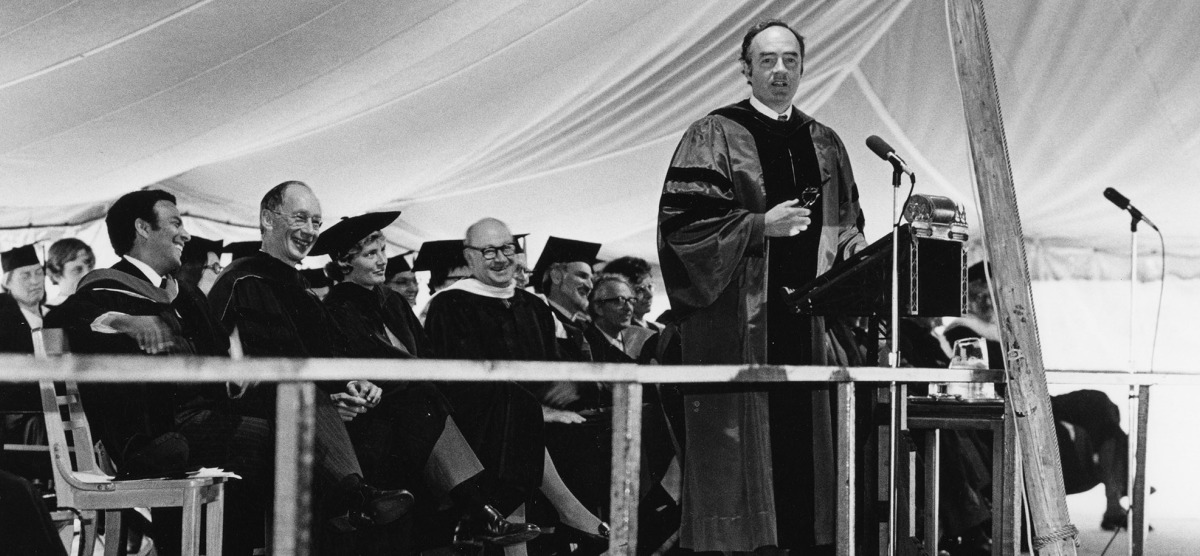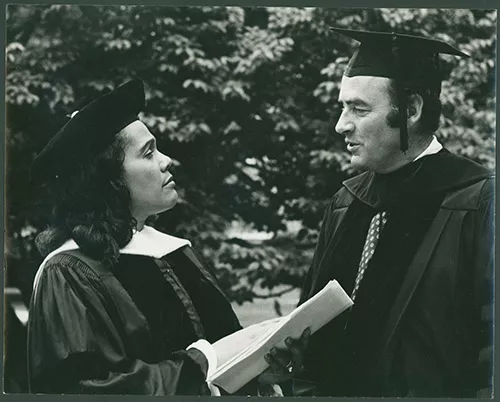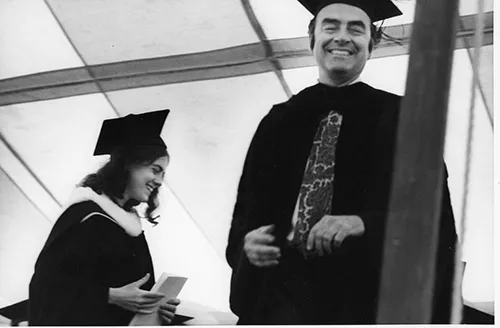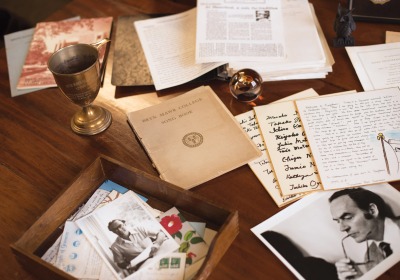
Remembering Harris Wofford
President Kim Cassidy pays homage to a global citizen, civil rights activist, U.S. senator, and Bryn Mawr president.
Bryn Mawr mourns the passing of its fifth president, Harris L. Wofford, who died from complications following a fall on January 22, 2019. President Wofford was 92.
I am grateful that the College had the opportunity to welcome President Wofford back to campus in September 2017 for a preview screening of a documentary chronicling his remarkable life of public service and personal integrity. Its title, Harris Wofford, Slightly Mad, references the late Senator Robert Kennedy’s description of Wofford as a “slight madman” because of his deep and idealistic commitment to civil rights.
President Wofford’s career spanned nearly eight decades and the fields of civil rights, politics, education, law, and national and international service. He had an outsized influence on politics and policy in the 1950s and 1960s and again in the late 1980s and 1990s, particularly in advancing civil rights for African Americans and South Africans and building organizations to advance international and national service. His early career included serving as counsel to the U.S. Civil Rights Commission in the mid to late 1950s, working for John F. Kennedy’s presidential campaign and in the White House, helping to found the Peace Corps with Sargent Shriver, and working with Martin Luther King, Jr., in the Civil Rights Movement. He was president of SUNY Old Westbury from 1966 to 1970 before becoming president of Bryn Mawr from 1970 to 1978.
After publishing his 1980 memoir, Of Kennedy and Kings, he practiced law and was Pennsylvania State Democratic Chair before returning to government service, first as Pennsylvania’s Secretary of Labor and Industry. During the 1970s and 1980s, he was active in a South African civil rights organization that was engaged in non-violent programs that aimed to transform apartheid South Africa. He served in the U.S. Senate from 1991 to 1994, filling the term of John Heinz after the latter’s death. He was author of the National and Community Service Act of 1993, which created AmeriCorps and other service programs, and brought access to affordable health care into the national policy conversation. From 1994 until his death, he devoted himself to building national service programs, work that included leadership of AmeriCorps and of America’s Promise.
While he spent only eight years of his remarkable career at Bryn Mawr, President Wofford made a significant impact on the direction and character of the College. President Emeritus Pat McPherson, Ph.D. ’69, who was dean of the Undergraduate College during Wofford’s presidency, recalls that, “with Harris’s urging, the Undergraduate College became significantly more diverse. Committed to admitting a larger number of U.S. students of color and an increased number of international students, Harris recognized well before other liberal arts colleges that learning from other perspectives enhanced everyone’s education, and he was willing to commit significant dollars to that effort.”
Emeritus Director of Admissions Betty Vermey adds that in addition to “providing encouragement and funding for the recruitment and financial support of international students, particularly from Asia and Africa, Harris fostered Bryn Mawr’s long tradition of attracting eminent scholars and political figures to campus from abroad.”
President Wofford championed changes in the curriculum as well as in the demographics of the student body. Sociology Professor Bob Washington recalls that President Wofford “believed Africa should be more visible in Bryn Mawr’s curriculum. [He encouraged faculty discussions that] resulted in the creation of a small African Studies program at Bryn Mawr ... that subsequently evolved into a Bi-Co Africana Studies program.”
Becoming the second male president of Bryn Mawr wasn’t easy. President Emeritus McPherson says that “many alumnae voiced reservations about the selection of a male president. On the day of his inauguration in October, a rare snow squall blew in. Looking at the audience through the flakes, Harris quipped, ‘I know some of you said it would be a cold day in hell before Bryn Mawr had another male president ...’” Clearly he also had a sense of humor!
Professor Washington, who credits President Wofford as one of his motivations for joining the faculty at Bryn Mawr, speaks eloquently to his impact on the world and those who knew him: “Harris Wofford was a global citizen who maintained a lifelong commitment to social justice, diversity, international development, and non-violent social change. He did not simply advocate these values, he modeled them in his everyday life. In doing so, he had a major impact on the lives of the many who had the good fortune to know him.”
President Wofford was blessed by two happy marriages. He was married for 48 years to Clare Wofford, who died in 1996. Mrs. Wofford was held in high regard by the campus community and even returned to work at Bryn Mawr in the 1980s in what is now the Alumnae Relations and Development Office. They had three children, all of whom survive their parents: Daniel, David, and Susannah. President Wofford is also survived by his husband, Matthew Charlton, his partner of 15 years before their marriage in 2016.
Published on: 03/08/2019


